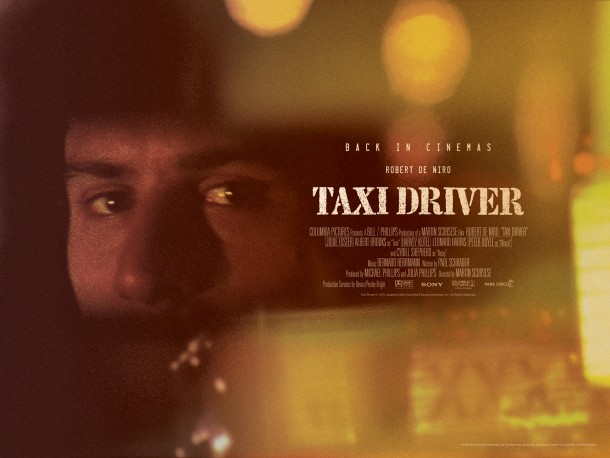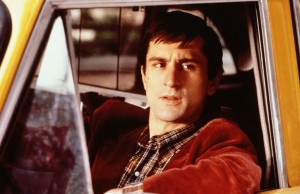
Dir: Martin Scorsese; Script: Paul Schrader; DoP: Michael Chapman; Score: Bernard Herrmann | 112 minutes | Cast: Robert De Niro, Cybill Shepherd, Jodie Foster, Harvey Keitel, Peter Boyle, Leonard Harris, Albert Brooks, and Martin Scorsese.
Scorsese’s searing portrait of alienation is every bit as raw and relevant now as it was in 1976. But it carries with it a message of hope; a happy ending that so often is different from today’s reality. Robert De Niro plays a young Vietman war veteran who fetches up post-combat in a Manhattan bedsit, aimless and unable to sleep and : “Loneliness has followed me all my life”.
TAXI DRIVER captures New York in the seventies, a neon trashcan stuffed with the American Dream where hopes slowly seep away into the steaming sewers while politicians slogans still promise: “A Return to Greatness” forty years ago.
 Meanwhile, in the city “all the animals come out at night: hustlers, pimps, pushers, frauds, and freaks—they’re all at large”. So hero/loner Travis Bickle (De Niro) takes a job where he can work long hours driving out to Brooklyn, The Bronx and Harlem and popping pills and watching blue movies to relax. He’s a complex and strangely charismatic character driven to the edge by his seclusion. But when he sees Sybill Shepherd’s political campaigner Betsy working in a Columbus Circle office, he becomes obsessed with her grace and beauty and boldly asks her for a date. A mutual attraction but blossoms then deteriorates when he takes her to an explicit film. Travis Bickle’s latent pyschosis then floats to the surface of a landscape that is increasingly hostile and depraved, but distinctly New York in the ’70s, as we are instantly wafted back there by Bernard Herrmann’s highly charged and woozily romantic score.
Meanwhile, in the city “all the animals come out at night: hustlers, pimps, pushers, frauds, and freaks—they’re all at large”. So hero/loner Travis Bickle (De Niro) takes a job where he can work long hours driving out to Brooklyn, The Bronx and Harlem and popping pills and watching blue movies to relax. He’s a complex and strangely charismatic character driven to the edge by his seclusion. But when he sees Sybill Shepherd’s political campaigner Betsy working in a Columbus Circle office, he becomes obsessed with her grace and beauty and boldly asks her for a date. A mutual attraction but blossoms then deteriorates when he takes her to an explicit film. Travis Bickle’s latent pyschosis then floats to the surface of a landscape that is increasingly hostile and depraved, but distinctly New York in the ’70s, as we are instantly wafted back there by Bernard Herrmann’s highly charged and woozily romantic score.
TAXI DRIVER is in many ways naive in its belief that its central protagonist can find salvation in such a sordid set of circumstances. When Travis is rejected by the fresh-faced college grad Betsy it feels like his world will implode and destruct but scripter Paul Schrader endows him with a backbone and integrity that fights back to vanquish evil, redeeming him as a hero of almost Christ-like proportions. He suffers, reaches out enters Hell and comes back again with glory. And De Niro plays him with a subtlety and strength of feeling and expression rarely seen on the bigscreen today. The spectrum of psychosis is so broad that it’s entirely plausible that this man eventually pulls through. He is not hard bitten criminal but a decent type who temporarily loses his way, like Dante’s hero.
More slick and than Scorsese’s other Manhattan movie Mean Streets, TAXI DRIVER is a deceptively nuanced narrative: drama, sex, politics, romance, violence coalesce in a richly textured character study. Scorsese himself appears in a vignette as a cuckolded husband watching his wife’s silhouette in her lover’s window; the scene in the gun parlour over-looking Manhattan island is full of authentic details, in another scene, a professional-looking street musician runs through Chuck Webb titles but nobody stops to listen.Travis Bickle is in some ways similar to Polanski’s tragic Parisian loner Trelkovsky in The Tenant which interestingly came out the same year. But he lacks the emotional ballast to underpin his psychosis, and get him back on the straight and narrow, like Travis. Clearly, Travis is a bundle of self-destructing neuroses but his redeeming feature is his respect and love for women. . He makes friends with the angelic and intelligent campaign worker, played by Cybill Shepherd. His unfortunate choice of movie shocks her, and their palpable sexual chemistry is unable to overcome this grave error on his part, committed not intentionally but due to his mind swimming with a complex brew of emotions and ideas. Jodie Foster plays a sympathetic teenage hustler, whose inner vulnerability captures Travis’ imagination and is his saving grace. Harvey Keitel plays a sleazy pimp. None of Scorsese’s main characters are inherently evil; they are just ordinary people driven to the wrong side of the tracks through of force of circumstance. And that’s probably why, with its positive, message of hope, TAXI DRIVER won the Palme d’Or that year, while The Tenant went away empty-handed despite its similar narrative vigour and acclaimed performances. MT
TAXI DRIVER IS BACK IN CINEMAS NATIONWIDE FROM 10 FEBRUARY AND AS PART OF THE BFI MARTIN SCORSESE RETROSPECTIVE UNTIL THE END OF FEBRUARY 2017